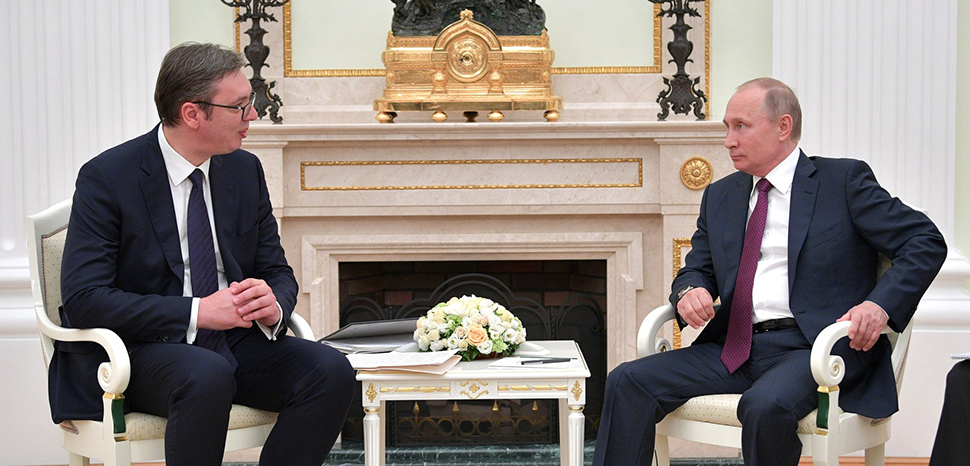A notable cultural resemblance between Russia and Serbia, embedded in Slavic identity and Eastern Orthodoxy, makes these two countries almost natural allies and unconditional mutual supporters. Popular widespread opinions, at least in Serbia, suggest that Russians and Serbs share everlasting cultural and historical bonds that become especially highlighted during crises.
Russia is widely respected and admired in Serbian society, with a considerable majority of Serbs believing that Russia is Serbia’s “greatest friend.” In addition, energy cooperation, an aversion to the West, and shared opposition to Kosovo’s independence contribute to the strengthening friendship between Russia and Serbia.
However, deeper analysis of Russo-Serbian relations show that this friendship might not be that profound or “pure” as the public suggests. Russo-Serbian friendship has been romanticized among nationalistic circles in both countries and has been exploited by opportunistic leaders when the circumstances allow it. Officials in Moscow and Belgrade have been far more pragmatic in their foreign policy moves, to such an extent that the Russo-Serbian friendship has remained in the public discourse in name only. Both countries pursue their own interests whereas social sentiments based on shared historic and emotional narratives are effectively used by political elites whose main goal is to maintain and secure power within their societies. Recent Russo-Ukrainian conflict has also revealed the pragmatic side of relations between Moscow and Belgrade.
Serbia’s Contradictory Foreign Policy
Contemporary Serbia`s foreign policy remains “Janus-faced” whereby it pursues a balancing foreign policy between Russia and the West, perceiving such neutrality as the most appropriate for defending its own interests in the current heightened geopolitical climate. Serbian officials have been trying to juggle between the leading actors present in the Balkans, the West, Russia and China, in order to preserve their own position and their own interests, which occasionally align with the interests of the state. Serbia has not officially adopted this foreign policy strategy, thus leaving space for greater maneuver and less accountability for state representatives. The foreign policy ambivalence that was announced after Kosovo’s independence in 2008 by then Serbian president, Boris Tadic, which relies on good relations with the EU, the US, China and Russia, has remained the leading thread of the country’s diplomatic pursuits to present day.
Serbia`s contradictory foreign policy is also reflected in its relations with Russia. Officially, Belgrade remains Moscow’s friend in Europe by refusing to support the EU sanctions regime amidst the Russo-Ukrainian conflict. However, the Serbian government calculated that the decision of not imposing sanctions on Russia would bring more benefits despite the increased pressure from the EU, and this move has little to do with the friendship narrative. First of all, Serbia has secured a three-year uninterrupted flow of gas from Russia under preferential terms that concurrently has brought political points to the ruling leadership for securing domestic energy needs, and has situated the country as a gas exporter to neighboring states. Furthermore, in the wake of the Ukraine war breaking out, Serbia’s economy has benefited from its non-sanctioned, free travel regime with Russia. Numerous business-oriented Russians, mostly from the IT sector, have established companies in the country and thus revived the underdeveloped domestic market, while the aviation sector has experienced increased profits due to frequent and unrestricted Moscow-Belgrade flights.
In terms of political interests, Serbia needs Russia to use its international influence and veto Kosovo’s applications for membership in the UN and other international organizations. Belgrade still perceives Kosovo as part of its territory and puts further diplomatic efforts in preventing Kosovo’s international recognition. Even though Serbia appreciates Russia’s continued and resolute opposition to recognizing the independence of Kosovo, the country has not been utterly supportive to its ally, especially since the Ukraine war started. For instance, Serbia supported not only a UN resolution denouncing Russian aggression against Ukraine but also refused to recognize the Russian annexation of Ukrainian territory. Serbia doesn’t hesitate to act according to its self-interests, even if that implies actions that do not align with its ally’s objectives.
The current Serbian leadership headed by Aleksandar Vucic perfected an ambivalent stance in the country’s foreign policy pursuits. Balancing between East and West can seemingly put Serbia in a difficult situation, however, such ambivalence provides the ruling government with more power domestically and internationally. While many Serbs perceive Russia as a historical ally, Serbian political elites have taken advantage of these public sentiments and have continued to allow a pro-Russian narrative through controlled media in order to please a more nationalistic-oriented public. Moreover, the leadership continues to implicate the West and the EU as the cause for various negative domestic issues and shifting the blame to less popular entities within Serbian society so as to stay in power.
There are a couple of declaratively Russian or pro-Russian political parties active in the Serbian political scene that serve as a reflection of the omnipresent impact of Serbian President Aleksandar Vučić and his ruling Serbian Progressive Party, rather than any particular sign of increased Russian influence in the country. The ruling establishment has supported the founding of pro-Russian parties for the purpose of exploiting pro-Russian sentiments among the public and gaining more influence over larger parts of Serbian society that support an anti-Western political orientation and discourse.
Russia’s Stance towards its “Little Brother”
Russia perceives the Western Balkans as an important region for exercising its foreign policy tactics that mostly revolve around advocating against NATO and EU integration as well as Kosovo’s independence in order to concurrently incite instability and anti-Western sentiment and strengthen its position of a great power. In the Balkans, Serbia remains the closest Russian partner due to cultural similarities and mutual aversion toward Euro-Atlantic integration. Russia`s political influence in Serbia has been reinforced through political narratives which stress traditional values, religious identity embodied in the Orthodox Church, pan-Slavism and the Kremlin’s position on Kosovo. However, Russia’s influence is limited to political and media fields since the country is not militarily present in the region and has insufficient economic influence that is mostly energy-oriented. In the economic sector, the EU remains the biggest economic partner to Serbia while Russia maintains its economic clout only through energy links and is unable to outperform the Union`s economic investments in the country.
Media and disinformation are a useful tool that Russia has been using to promote pro-Russian narratives and disperse anti-Western sentiment through (social) media in the region. Russia is able to reach the Serbian public through local media outlets, in particular pro-government tabloids, due to government-controlled media that deliberately promotes anti-Western attitudes, as well as pro-Russian and pro-Chinese narratives in Serbia. That said, Russian narratives are mostly popularized in the local media as a result of local initiatives rather than direct Russian involvement. As long as it is in the interest of the Serbian government to have anti-Western and pro-Russian narratives circulating in the media and attracting the public, Russian propaganda will be able to penetrate Serbian society and effectively spread disinformation.
Even though Serbia represents one of very few remaining allies in Europe, Russia still does not invest enough in achieving a sustainable and purposeful relations with Serbia, but rather pursues an opportunistic foreign policy which targets specific entities and topics such as pro-Russian politicians, the Orthodox Church, media channels, the Kosovo issue, and common historical and cultural heritage in order to expand its influence in the country. Russia’s soft power is considerable in a Serbian society rife with anti-Western sentiment following the bitter experience of 1999 NATO aggression amid Kosovo’s independence. Many Serbs consider Russia a selfless ally and are convinced that the country will be the dominant power in the twenty-first century. However, the Kremlin`s disinterest in exploiting Serbian positive attitudes towards Russia in a more strategic and all-encompassing way, as well as local government`s clout over media and public, prevent Moscow from entrenching its influence in Serbia and the wider region.
Russia is still preoccupied with its “grand” and imperialistic projections and wants to return to world politics in the capacity of a great power. The Kremlin exercises expansionist foreign policy based on irredentist claims and the idea of “Greater Russia” while actively investing in the return of Russia’s old glory of being an imperial and respected power globally. In such a foreign policy framework, other smaller countries, in particular those outside of Russia’s immediate neighborhood, are merely another peripheral area for spreading the country’s influence – not strategically important enough to be considered worthy of more serious strategic planning.
True Friendship in Name Only
Deeper analysis of Russo-Serbian relations reveals that the two countries pursue their own interests and use each other for satisfying foreign and domestic policy goals rather than providing the kind of unconditional support often imagined in public discourse and media narratives. Even though Russia and Serbia maintain good political and economic ties, the political elites of both countries pursue opportunistic approaches in bilateral relations in order to strengthen their position and power.
The views expressed in this article belong to the authors alone and do not necessarily reflect those of Geopoliticalmonitor.com.




